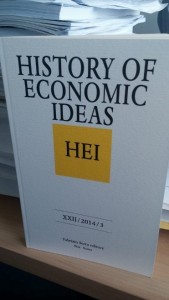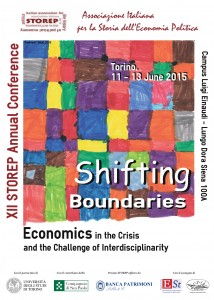[:it]
[Deadline extended (October 15)!]
Following a tradition initiated last year with the Torino Conference, selected papers focusing on the main topic of the STOREP 2016 Conference will be published in a sub-issue of History of Economic Ideas.
The sub-issue will deal with how economies evolve and change through time. Adopting an  historical (history-of-ideas) perspective, it wants to investigate, in particular, engines of growth that have received comparatively less attention in the literature, and speculate about how culture, institutions, visions, expectations (growth and development being in times of crisis and more than ever the concern not only of policy-makers and analysts, but of human beings in general) have affected the actual thinking on growth and development and how such thoughts have finally produced an impact on the dynamics of real economies.
historical (history-of-ideas) perspective, it wants to investigate, in particular, engines of growth that have received comparatively less attention in the literature, and speculate about how culture, institutions, visions, expectations (growth and development being in times of crisis and more than ever the concern not only of policy-makers and analysts, but of human beings in general) have affected the actual thinking on growth and development and how such thoughts have finally produced an impact on the dynamics of real economies.
We therefore invite participants in the conference to submit their papers for the sub-issue. It is to be noted that papers presented at the conference are not per se considered for the sub-issue. Full papers must reach the STOREP 2015 Conference organizing committee (segretario@storep.org, email subject: “STOREP 2016 Conference Sub-Issue”) by September 15, 2015.
(Anonymous) papers must be provided in Microsoft word or similar word processor (but not in pdf format); authors must indicate in a separate cover name, affiliation and e-mail address. Articles should be written in standard English (a native English speaker should revise the paper, the case being, before submission) and should not normally exceed 12,000 words, including footnotes and references. An abstract of about 100 words is also required, together with up to five keywords and three JEL classifications. Authors should carefully check the conformity of their manuscripts to History of Economic Ideas editorial guidelines (see www.historyofeconomicideas.com/authors.php).
The Editorial Committee will select among submitted papers the candidates for the sub-issue; these latter will undergo a process of review by anonymous referees in line with the regular procedures of HEI.
www.historyofeconomicideas.com
 The STOREP 2015 Conference Special Issue of History of Economic Ideas (note that, being the first of the series, this issue is larger than the sub-issues that will follow) is currently being finalized, and will appear as Vol. XXIV, n. 2. Below are details about the issue.
The STOREP 2015 Conference Special Issue of History of Economic Ideas (note that, being the first of the series, this issue is larger than the sub-issues that will follow) is currently being finalized, and will appear as Vol. XXIV, n. 2. Below are details about the issue.
SHIFTING BOUNDARIES. Economics in the Crisis and the Challenge of Interdisciplinarity
History of Economic Ideas, STOREP 2015 Special issue
Shifting Boundaries. New and Old Tendencies in Economics
M. Cedrini and S. Fiori
Invited papers
Economics Imperialism versus Multidisciplinarity
J.B. Davis
The Complex Nature of Economic Liberalism
A. Kirman
Rationality and Rules: Behavioral Foundations and Policy Implications
V.J. Vanberg
Is History of Economics What Historians of Economic Thought Do? A Quantitative Investigation
M.C. Marcuzzo and G. Zacchia
Accepted (submitted) papers
Pareto-efficiency from Pareto to contemporary economics
I. Berthonnet
Disciplinary Division of Social Sciences and Methodological Issues in Economic Imperialism and Economic Pluralism from a Critical Naturalist Viewpoint
F. Chafim
The Politics of Neoclassical Economics: Insights from Foucault’s History of Governmentality
C. Gürkan
Disputed (Disciplinary) Boundaries. Philosophy, Economics and Value Judgments
P. Silvestri[:en]
Following a tradition initiated last year with the Torino Conference, selected papers focusing on the main topic of the STOREP 2016 Conference will be published in a sub-issue of History of Economic Ideas.
The sub-issue will deal with how economies evolve and change through time. Adopting an  historical (history-of-ideas) perspective, it wants to investigate, in particular, engines of growth that have received comparatively less attention in the literature, and speculate about how culture, institutions, visions, expectations (growth and development being in times of crisis and more than ever the concern not only of policy-makers and analysts, but of human beings in general) have affected the actual thinking on growth and development and how such thoughts have finally produced an impact on the dynamics of real economies.
historical (history-of-ideas) perspective, it wants to investigate, in particular, engines of growth that have received comparatively less attention in the literature, and speculate about how culture, institutions, visions, expectations (growth and development being in times of crisis and more than ever the concern not only of policy-makers and analysts, but of human beings in general) have affected the actual thinking on growth and development and how such thoughts have finally produced an impact on the dynamics of real economies.
We therefore invite participants in the conference to submit their papers for the sub-issue. It is to be noted that papers presented at the conference are not per se considered for the sub-issue. Full papers must reach the STOREP 2015 Conference organizing committee (segretario@storep.org, email subject: “STOREP 2016 Conference Sub-Issue”) by September 15, 2015.
(Anonymous) papers must be provided in Microsoft word or similar word processor (but not in pdf format); authors must indicate in a separate cover name, affiliation and e-mail address. Articles should be written in standard English (a native English speaker should revise the paper, the case being, before submission) and should not normally exceed 12,000 words, including footnotes and references. An abstract of about 100 words is also required, together with up to five keywords and three JEL classifications. Authors should carefully check the conformity of their manuscripts to History of Economic Ideas editorial guidelines (see www.historyofeconomicideas.com/authors.php).
The Editorial Committee will select among submitted papers the candidates for the sub-issue; these latter will undergo a process of review by anonymous referees in line with the regular procedures of HEI.
www.historyofeconomicideas.com
 The STOREP 2015 Conference Special Issue of History of Economic Ideas (note that, being the first of the series, this issue is larger than the sub-issues that will follow) is currently being finalized, and will appear as Vol. XXIV, n. 2. Below are details about the issue.
The STOREP 2015 Conference Special Issue of History of Economic Ideas (note that, being the first of the series, this issue is larger than the sub-issues that will follow) is currently being finalized, and will appear as Vol. XXIV, n. 2. Below are details about the issue.
SHIFTING BOUNDARIES. Economics in the Crisis and the Challenge of Interdisciplinarity
History of Economic Ideas, STOREP 2015 Special issue
Shifting Boundaries. New and Old Tendencies in Economics
M. Cedrini and S. Fiori
Invited papers
Economics Imperialism versus Multidisciplinarity
J.B. Davis
The Complex Nature of Economic Liberalism
A. Kirman
Rationality and Rules: Behavioral Foundations and Policy Implications
V.J. Vanberg
Is History of Economics What Historians of Economic Thought Do? A Quantitative Investigation
M.C. Marcuzzo and G. Zacchia
Accepted (submitted) papers
Pareto-efficiency from Pareto to contemporary economics
I. Berthonnet
Disciplinary Division of Social Sciences and Methodological Issues in Economic Imperialism and Economic Pluralism from a Critical Naturalist Viewpoint
F. Chafim
The Politics of Neoclassical Economics: Insights from Foucault’s History of Governmentality
C. Gürkan
Disputed (Disciplinary) Boundaries. Philosophy, Economics and Value Judgments
P. Silvestri[:]
